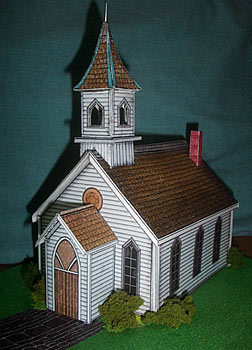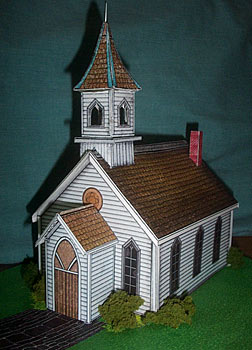 Church, Part 3:
Church, Part 3: Here's the last part, which is equally challenging:
As it is, there are many parts, but one body. The eye cannot say to the hand, "I don't need you!" And the head cannot say to the feet, "I don't need you!" On the contrary, those parts of the body that seem to be weaker are indispensable, and the parts that we think are less honorable we treat with special honor. -1 Corinthians 12:20-23.
At first this might seem like this is saying the same thing that it did in the last passage. But that passage focused on the way that the church needs people. This passage focuses on the way that people need the church. This takes away the even greater excuse I catch myself using: that I don't need a church to be connected with God, that I can go it alone, that I can be a church of one.
A few years ago I had this situation explained to me with the following story: Once, a man was lifting weights at the gym. Somehow, one of the weights slipped, caught one of his fingers, and tore off the tip. Gross, I know. Bear with me. The man was rushed to the hospital. Once there, they asked him where the fingertip was so that they could reattach it. But the fingertip was nowhere to be found. After a few days, someone found the fingertip stuck in the hole part in a stack of weights--the part that the bar goes through. But by then, the fingertip had been separated from the man's body for too long, it was dead, and it could not be reattached. The moral of the story: if you are separated from the body for too long, you will die, spiritually speaking. I have never forgotten that story. It really and truly scared me to think about, and that story always comes to mind whenever I think about going it on my own.
Your relationship with God is a personal, one-on-one type of thing. But God also designed us to experience a relationship with him through our relationships with people. We are meant to meet together, to pray and worship together, to confess our sins to each other and pray for each other, to encourage and lift each other up. People need the church. We need the church for support, but more importantly, we need it for protection.
Consider this passage:
Be self-controlled and alert. Your enemy the devil prowls around like a roaring lion looking for someone to devour. Resist him, standing firm in the faith, because you know that your brothers throughout the world are undergoing the same kind of sufferings. -1Peter 5:8-9
Lions kill the animals that they are able to separate from the rest of the herd. You've heard the term, "safety in numbers"? Spiritually speaking, this is doubly true. Alone, we are very vulnerable to attack. It doesn't take us long to get discouraged, to fall out of the habit of talking with God, to harden our hearts against people. But together, we can help each other to stand firm.
So: Let us hold unswervingly to the hope we profess, for he who promised is faithful. And let us consider how we may spur one another on toward love and good deeds. Let us not give up meeting together, as some are in the habit of doing, but let us encourage one another. . . -Hebrews 10:24-25
Notice that it keeps saying "we" and "us." Again and again, we are reminded that we are meant to be together. We are needed by the church, and we need church. We are parts of one body.
What part am I? Maybe a mouth (although I am trying, with varying success, to learn to be quiet and gentle). I think I'd like to be an eye.





.jpg)
